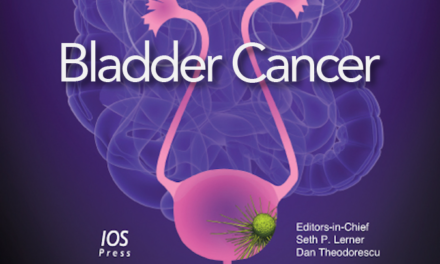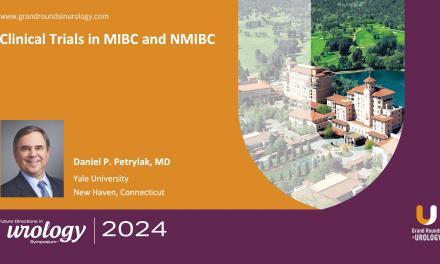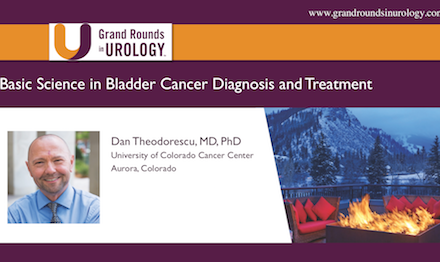Seth P. Lerner, MD, presented “Managing NMIBC in the BCG Shortage Era” during the 25th Innovations in Urologic Practice conference on September 24, 2021, in Santa Fe, New Mexico.
How to cite: Lerner, Seth P. “Managing NMIBC in the BCG Shortage Era.” September 24th, 2021. Accessed Jul 2025. https://grandroundsinurology.com/managing-nmibc-in-the-bcg-shortage-era/
Managing NMIBC in the BCG Shortage Era – Summary
Seth P. Lerner, MD, Professor of Urology and holder of the Beth and Dave Swalm Chair in Urologic Oncology in the Scott Department of Urology at Baylor College of Medicine, explains the bacillus Calmette-Guérin (BCG) shortage and discusses how physicians should adjust treatment decisions for non-muscle invasive bladder cancer (NMIBC). He outlines a joint guideline statement made by the AUA, AACU, BCAN, SUO, LUGPA, and UCF on February 19, 2019, which stated that BCG should not be used for low-risk disease, that alternative intravesical chemotherapy should be used for second-line intermediate-risk disease, that patients with high-risk NMIBC should be prioritized for full-strength BCG, and that if full doses are unavailable then reduced doses should be used. Dr. Lerner then discusses the SWOG BCG maintenance protocol, which shows a clear benefit over other protocols. He reviews the BCG dose reduction process and describes how to bill for it. Dr. Lerner also gives an overview of a trial on optimizing mitomycin delivery that found that dehydrating the patient and ensuring the bladder is empty prior to instillation is key, and that optimized delivery can double recurrence-free survival at 5 years. Dr. Lerner outlines BCG-naive clinical trial agents and shows data indicating that gemcitabine with docetaxel can be used to supplement BCG treatment. He states that very high-risk patients should receive radical cystectomies early due to a dropoff in survival in patients who wait to receive cystectomies. Dr. Lerner concludes that optimized intravesical mitomycin and doublet chemotherapy regimens are active in both intermediate and high-risk disease, and that radical cystectomy’s complete and usually durable response for pathologic NMIBC should not be ignored.
About The 25th Annual Innovations in Urologic Practice:
Presented by co-chairs Mohit Khera, MD, MBA, MPH, and Michael Coburn, MD, FACS, the Innovations in Urologic Practice conference provides a detailed review and commentary on multiple genitourinary and urologic diseases. Among the featured oncological topics are bladder cancer and immunotherapies, as well as upper tract cancer management, prostate cancer, including state-of-the-art imaging, focal therapy, and MRI. Experts also discuss new tools and techniques for nephrectomy and treating advanced renal cell carcinoma. In terms of general urological approaches, the conference also includes pelvic reconstruction and trauma, men’s health topics like male infertility and sexual dysfunction, and ways to diagnose and treat infections in the urology patient. Dr. Lerner presented this talk at the 2021 conference.
For further educational activities from this conference, visit our collection page.
ABOUT THE AUTHOR
Seth P. Lerner, MD, FACS, is Professor of Urology and Vice-Chair for Faculty Affairs in the Scott Department of Urology at the Baylor College of Medicine in Houston, Texas. He holds the Beth and Dave Swalm Chair in Urologic Oncology. Dr. Lerner is the Director of Urologic Oncology and the Multidisciplinary Bladder Cancer Program, also at Baylor.
Dr. Lerner earned his medical degree from the Baylor College of Medicine, completed a surgical internship at Virginia Mason Hospital in Seattle, and returned to Baylor for his residency training. He completed a two-year fellowship at the University of Southern California in Urologic Oncology and Reconstructive Surgery and joined the full-time Baylor faculty in 1992.





